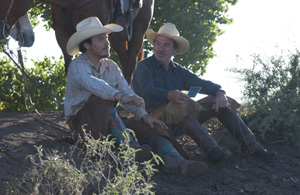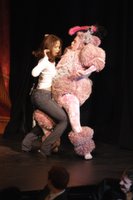 In a weekend in which Barney Fife kicked it, let's not forget the Old Man. Darren McGavin, who played loutish patriarch Mr. Parker in A Christmas Story, died yesterday in California at 83.
In a weekend in which Barney Fife kicked it, let's not forget the Old Man. Darren McGavin, who played loutish patriarch Mr. Parker in A Christmas Story, died yesterday in California at 83.All right, I'll get that kid to eat. Where's my screw driver and my plumber's helper? I'll open up his mouth and I'll shove it in.
A prolific participant on stage and screens both big and small, McGavin bought his ticket to immortality with A Christmas Story. Old Man Mr. Parker was the repressed embodiment of the post-war American male, who viewed his newfound suburban homefront as suspiciously and aggressively as he did Normandy. There were battles to be fought and won at home -- getting his whiny son to finish his mashed potatoes, frantically changing a blown tire on a salty Indianan highway, fending off daily premeditated attacks by the Bumpus hounds from next door, grappling with an insidious soot-spitting furnace in the basement.
It'sss a clinkerrr! That blasted stupid furnace, dadgummit! Oh for cripes sake open up the damper will ya? Who the hell turned it all the way down? AGAIN! Oh blasted!
This was one of the cinema's great comic performances. McGavin's Old Man was archetypal, vicious yet sweet-natured, with his own warped sense of discipline and decorum (he could fire off "F dash dash dash" anytime, but expect a bar of soap when you did). He reminded everyone of an uncle, if not their own father, if not what they expected their uncles and fathers to be. This was a man who was ecstatic to receive a can of Simonize under the tree, but nonplussed when there was no tie to go with it. This was a man who never seemed to be out of a shirt and tie, looking like he was always going to or coming from work, but never seeming to work at all -- except on important matters, like selecting the perfect Christmas tree or securing a major mail-in award.
What is a lamp, you nincompoop? It's a Major Award. I won it!
Oh that award. The leg lamp, the enduring symbol of the movie, of middle-class
 accomplishment. There are, no doubt, a thousand fathers across the country who annually conjure a bit of the Old Man's insanity, pulling out a replica lamp each Christmas and lustily, proudly displaying the soft glow of its electric sex in the front center window for the neighbors to gawk at, as the wife furrows her brow in mortification behind the curtain. "It's so tacky," she might say. He might simply hitch his pants, shake his head and think, "You don't know the hell I went through to get this."
accomplishment. There are, no doubt, a thousand fathers across the country who annually conjure a bit of the Old Man's insanity, pulling out a replica lamp each Christmas and lustily, proudly displaying the soft glow of its electric sex in the front center window for the neighbors to gawk at, as the wife furrows her brow in mortification behind the curtain. "It's so tacky," she might say. He might simply hitch his pants, shake his head and think, "You don't know the hell I went through to get this.""With as much dignity as he could muster, the Old Man gathered up the sad remains of his shattered Major Award. Later that night, alone in the backyard, he buried it next to the garage. Now I could never be sure, but I thought that I heard the sound of 'Taps' being played. Gently."
.jpg)























